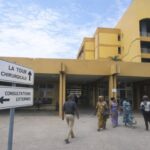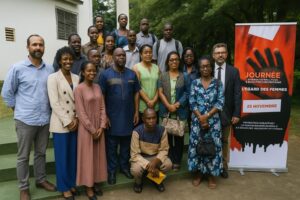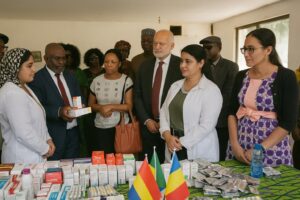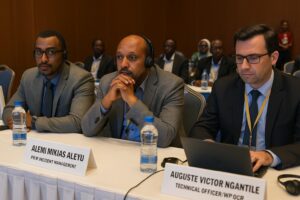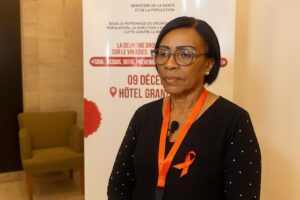Diplomatic Confluence in Kintélé
For forty-eight hours in mid-July 2025 the convention centre of Kintélé became a laboratory of public-health diplomacy. Chaired by Health and Population Minister Professor Jean-Rosaire Ibara and attended by senior representatives of WHO, UNICEF and the World Bank alongside prefectural authorities, the second ordinary session of the National Health Council operated as a clearing-house for data, testimonies and strategic proposals. Observers noted that the setting, barely twenty kilometres from Brazzaville yet symbolically distinct from the capital’s bustle, offered a calm arena to test the robustness of the national health vision endorsed by President Denis Sassou Nguesso within the broader Plan national de développement 2022-2026.
Legal and Financial Foundations Under Scrutiny
A recurrent leitmotif of the debates concerned the statutory architecture of the Council itself. Delegates concurred that a clearer legal mandate, coupled with an upgraded secretariat, would transform the body from an advisory forum into an instrument capable of monitoring implementation in real time. Financing questions followed naturally. Citing recent IMF figures that place health expenditure at 2.6 % of GDP, participants advocated a calibrated increase to approach the 5 % benchmark recommended by the Abuja Declaration, while safeguarding macroeconomic stability. Several speakers highlighted the domestic revenue mobilisation potential embedded in the new hydrocarbons code and the nascent sovereign wealth fund, suggesting earmarked tranches for health innovation.
Infrastructure and Workforce: The Twin Pillars
Discussions quickly shifted from theory to the texture of everyday service delivery. Field reports presented by district medical officers revealed that almost one third of primary facilities still operate without reliable electricity. In response, the Council’s communiqué urges an accelerated rollout of solar micro-grids and cold-chain equipment, aligning with the Ministry of Energy’s rural electrification roadmap. Equally critical is human capital. According to WHO’s latest country profile the doctor-to-population ratio stands at 0.9 per 10 000 inhabitants, well below the African Union’s target of 2.3. The Council therefore recommended a dual strategy: expanded scholarships for medical specialities at the Marien-Ngouabi University, and incentive packages to retain practitioners in remote districts, including housing allowances and career-progression guarantees.
From Epidemic Readiness to Climate Resilience
The memories of the 2023 Mpox outbreak and the perennial threat of Ebola framed a sober appraisal of emergency preparedness. Delegates endorsed the creation of a real-time digital surveillance hub, interoperable with the Africa CDC’s regional platform, to shorten diagnostic feedback loops. Yet epidemic vigilance was only part of a wider ambition to embed environmental determinants in health policy. Citing the Congo Basin’s role as a planetary carbon sink, climate scientists detailed how shifting rainfall patterns already influence malaria vectors and waterborne diseases. The Council’s final text therefore intertwines epidemic management with broader climate adaptation, calling for health-impact assessments in every major infrastructure project and for community-led reforestation programmes to serve as both ecological and preventive-health interventions.
Public-Private Synergies and the Road Ahead
An atmosphere of pragmatic optimism permeated the closing session as deliberations turned to partnership diplomacy. Representatives of two leading telecommunications firms signalled readiness to co-finance telemedicine platforms, while an international consortium of faith-based hospitals offered to pilot value-based procurement. The Council synthesised its work into nine intertwined recommendations: codifying its legal framework, securing sustainable financing, upgrading infrastructure, strengthening emergency management, intensifying health promotion with community ownership, elevating the status of health professionals, widening equitable access through revitalised districts, catalysing public-private cooperation and mainstreaming climate considerations across policy instruments. Looking forward, Minister Ibara announced that the next Council session will move from prescription to ratification, with a detailed scorecard to be presented to the Cabinet. In diplomatic corridors the sentiment was that, if consistently stewarded, the Kintélé prescriptions could anchor Congo-Brazzaville’s ambition for universal health coverage and reinforce its standing as a regional convenor of evidence-based reform.


